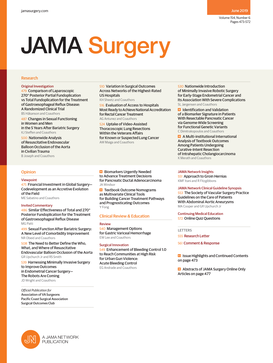Clinical Practice Guideline Recommendations on Mental Health in Trauma: A Systematic Review.
IF 15.7
1区 医学
Q1 SURGERY
引用次数: 0
Abstract
Importance Many survivors of traumatic injuries are affected by mental disorders, which has recently led to the publication of clinical practice guidelines (CPGs). However, there is no comprehensive synthesis of guideline recommendations to inform clinicians on those that should be prioritized for implementation and thus promote adherence to them. Objective To identify guideline recommendations for the prevention and management of mental disorders in patients with traumatic injuries, appraise their quality, and synthesize the quality of evidence and the strength of included recommendations. Evidence Review MEDLINE, Embase, CINAHL, PsycINFO, Cochrane Central, Web of Science, and 61 websites of professional associations and guideline repositories were searched between January 2008 and September 2024. We included CPGs pertinent to the acute and early recovery phases (<3 months) of adult patients (≥18 years) with traumatic injuries with at least 1 recommendation on mental health. Pairs of reviewers independently extracted data and assessed guideline quality using the Appraisal of Guidelines Research and Evaluation (AGREE) II tool. The quality of evidence on recommendations was synthesized using a matrix based on the categories of the Grading of Recommendations, Assessment, Development and Evaluation (GRADE). Mental health recommendations had to target prevention, screening, evaluation, intervention, referral for follow-up or specialized services, and a patient- and family-centered care approach. Findings Forty-three CPGs were included, 25 of which (58%) were high quality. Rigor of development, applicability, lack of involvement from all interested parties, and editorial independence were the most common methodological weaknesses. High-quality CPGs included 200 recommendations; of these, 50 (25%) were supported by moderate- to high-quality evidence and 30 (60%) targeted patients with traumatic brain injury. They covered mainly nonpharmacological and pharmacological interventions to treat acute stress disorder, substance use disorders, posttraumatic stress disorder, depression, or aggression. Fewer recommendations related to prevention, screening, evaluation, and referral were identified as having high empirical support. Conclusions and Relevance Fifty recommendations were identified that may be considered for implementation in clinical settings in patients with traumatic brain injury and other trauma populations. Our review underlines important areas for future research, including training for clinicians, a patient- and family-centered care approach, and health care equity.创伤患者心理健康临床实践指南建议:系统综述
许多创伤幸存者受到精神障碍的影响,这导致了临床实践指南(CPGs)的出版。然而,目前还没有全面综合的指南建议来告知临床医生应该优先实施哪些建议,从而促进对这些建议的遵守。目的确定外伤性精神障碍预防和治疗的指南建议,评价其质量,综合证据质量和纳入建议的强度。在2008年1月至2024年9月期间检索了Evidence ReviewMEDLINE、Embase、CINAHL、PsycINFO、Cochrane Central、Web of Science以及61个专业协会网站和指南库。我们纳入了与创伤性成年患者(≥18岁)急性和早期恢复阶段(<3个月)相关的cpg,并至少有1项心理健康建议。成对的审稿人独立提取数据,并使用指南研究和评估评估(AGREE) II工具评估指南质量。采用基于建议分级、评估、发展和评价(GRADE)类别的矩阵来综合建议证据的质量。心理健康建议必须针对预防、筛查、评估、干预、转介后续或专门服务,以及以患者和家庭为中心的护理方法。结果纳入43个cpg,其中25个(58%)为高质量。开发的严谨性、适用性、缺乏所有相关方的参与以及编辑独立性是最常见的方法弱点。高质量cpg包括200条建议;其中,50例(25%)有中等至高质量的证据支持,30例(60%)是针对创伤性脑损伤患者。他们主要涵盖了治疗急性应激障碍、物质使用障碍、创伤后应激障碍、抑郁或攻击的非药物和药物干预。较少与预防、筛查、评估和转诊相关的建议被确定为具有高经验支持。结论和相关性确定了50条建议,可考虑在创伤性脑损伤患者和其他创伤人群的临床环境中实施。我们的综述强调了未来研究的重要领域,包括临床医生培训,以患者和家庭为中心的护理方法,以及卫生保健公平性。
本文章由计算机程序翻译,如有差异,请以英文原文为准。
求助全文
约1分钟内获得全文
求助全文
来源期刊

JAMA surgery
SURGERY-
CiteScore
20.80
自引率
3.60%
发文量
400
期刊介绍:
JAMA Surgery, an international peer-reviewed journal established in 1920, is the official publication of the Association of VA Surgeons, the Pacific Coast Surgical Association, and the Surgical Outcomes Club.It is a proud member of the JAMA Network, a consortium of peer-reviewed general medical and specialty publications.
 求助内容:
求助内容: 应助结果提醒方式:
应助结果提醒方式:


